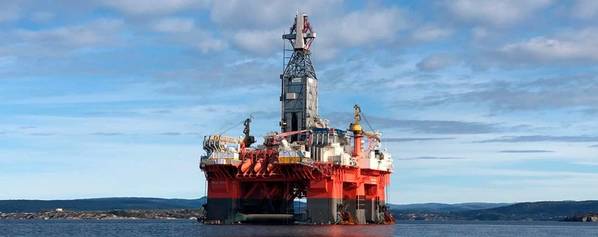
Northern Drilling’s West Mira is the first rig in operation to be awarded the DNV GL Battery (Power) class notation. West Mira is an ultra-deepwater semi-submersible designed by Moss Maritime, operating a hybrid power plant using Lithium-ion batteries as spinning reserve in dynamic positioning (DP) operations and to supply power during peak load times.
“With the Battery (Power) class notation, we are helping our customers in the offshore industry take advantage of new technologies for safer, more energy-efficient and environmentally friendly operations,” said Geir Fuglerud, Director of Offshore Classification at DNV GL. “Hybrid and fully electric battery solutions have already been installed in almost 200 marine vessels globally. We are now seeing offshore rigs stepping up to take advantage of these energy storage systems, with several more rigs soon to follow West Mira.”
Installation and testing of the energy storage system have been completed with close cooperation between Seadrill/Northern Drilling, Siemens, Kongsberg Maritime and DNV GL. By using the four converter-battery systems, the operator estimates it will be able to reduce the runtime of the rig’s on-platform diesel engines by 42%, cutting CO2 emissions by 15% and NOx emissions by 12%. The system will also serve as back-up to prevent blackout situations and provide power to the thrusters in the unlikely event of loss of all running machinery on affected switchboard segments.
“We are proud to be the first rig contractor worldwide to have received this class notation. By incorporating batteries, we can reduce the runtime of the diesel engines and maintain operations at an optimized combustion level, thereby increasing energy efficiency whilst lowering emissions,” said Henrik Michael Hansen, Area Director, Seadrill. Seadrill are managing the West Mira on behalf of Northern Drilling. “West Mira has now left Bergen and is heading for operations on the Nova Field in the North Sea.”
The Battery class notation applies to Li-on batteries of >20 kWh installed on board DNV GL classed vessels and offshore rigs and builds on DNV GL’s rules for the installation and use of Li-on batteries. DNV GL has also updated its rules for dynamic positioning to include batteries as a “spinning reserve”, a redundant power source for dynamically positioned vessels designed to fulfil IMO equipment class 2 or 3 for vessels with DP systems.